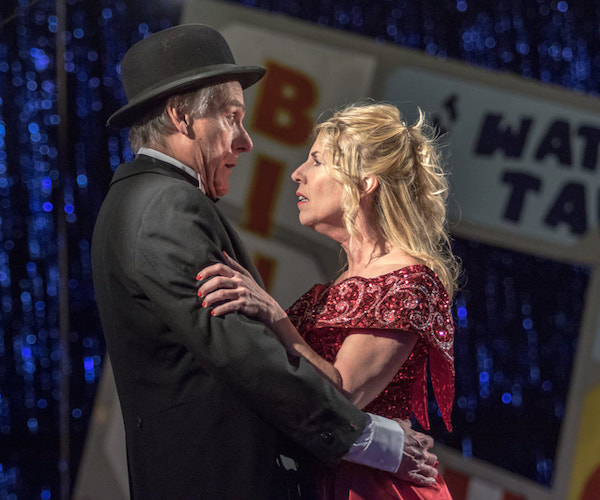Theater Review: Wilbury Theatre Group’s “The Skin of Our Teeth” — Surreal Meltdown
The WTG production succeeds largely because it heightens the absurdity of a play about catastrophe that Wilder himself warns us not to take too seriously.
The Skin of Our Teeth by Thornton Wilder. Directed by Josh Short. Staged by the Wilbury Theatre Group at 40 Sonoma Court, Providence, Rhode Island, through February 11.

Tom Roberts and Melissa Penick in the Wilbury Theatre Group production of “The Skin of Our Teeth.” Photo: Erin X. Smithers.
By Mary Paula Hunter
When he’s not producing the works of such Off-Broadway hit makers as Young Jean Lee or Annie Baker, Wilbury Theatre Group Artistic Director Josh Short likes to re-envision the classics. Usually, his approach to updating involves inserting various elements into the text: music, a bit of choreography or a utilitarian set design that aims to create a Brechtian environment. His latest effort, Thornton Wilder’s The Skin of Our Teeth (1942), succeeds largely because his strategies heighten the absurdity of a play about catastrophe that Wilder himself warns us not to take too seriously.
Singers, a horn player, and dancers roam the theater as the cast members continually reconfigure the performance space. At one point, I was asked to give up my chair. Nothing is stable, everything changes — which makes sense in a play set both in the Stone Age and the present and populated by a fortune teller, refugees, a woolly mammoth, and a dinosaur.
The surreality of The Skin of our Teeth centers around the trials and tribulations, throughout time, of the Antrobus clan, who look to be the perfect American family. Along with doting parents George and Maggie (married only 5000 years), there’s son Henry and adorable daughter Gladys. The only hitch: Henry may have killed his brother, and Gladys has an exhibitionist fetish.
The children aren’t the only flawed characters in this grand overview of mankind’s wretched history. Mrs. Antrobus, played by a wonderfully vexed yet determined Sarah Leach, over-protects her children when she isn’t slapping them, and her husband, an inventor of the wheel, loses his moral compass when he runs for office and takes up with a beauty queen.
Written on the verge of WWII, The Skin of Our Teeth is not afraid of tackling grand themes about human existence and survival, to the point that it often feels ridiculously ambitious. The nature of time, psychology, the arts as a refuge during troubled times, sexuality as a force for good or bad; all of these themes and more are jumbled together as the narrative moves from the Ice Age to Noah’s Flood, and finally to the Great War and its aftermath.
Short encourages Wilder’s chaos in the cavernous space that WTG now calls home, setting up overlapping actions. Musicians are perched above the audience; there’s bingo game behind us, and a fortune teller parades on a cat walk. Successfully taking in all of this is our job; Short demands active participation. At one point, popcorn bags are handed out as replenishments for the fatigued.
But, as crazy as the play becomes over three acts, the message always revolves around the simple truth that life goes on. A depressed Mr Antrobus ably portrayed by Tom Roberts, is reminded that starting over is our single most important job. Sabrina, the long-suffering maid and object of Mr. Antrobus’ desire, tells us “not to inquire into why or whither, but to enjoy your ice cream while it’s on your plate…” Gladys emerges from the wartime bunker with a baby — a symbol of nature’s urge to reproduce and endure.
Unfortunately, for today’s audiences the apocalyptic threats of climate change and environmental disaster render Wilder’s optimistic advice untenable. What more, dueling egoists — with itchy fingers on nuclear buttons – generate a dark fear that simply going on may not be enough to perpetuate the species.
Adding to the sense that the play is out of step is Wilder’s advice to read the classics for guidance on how to live. Homer, Aristotle, Plato, Spinoza are his mentors — pillars of a white dead male canon that are still indispensable to read, but hardly exclusively.
Still, in the final scene, Wilder offers a relevant antidote to the play’s uplift by giving us an aggrieved Henry Artrobus, a young man whose need for revenge resonates with today’s audiences. Like Hitler and Trump, Henry, played as a nasty spoiled brat by Jason Roth, reviles men of the past, people such as his father, who he believed never liked him, never treated him fairly. One could hear in his harangue the speeches of our current leader, who whips his followers into a mania and then sets them onto revenge against the ‘others,’ who are supposedly robbing them of success. The politics of aggrievement live on, as Wilder understood and sensibly feared.
Mary Paula Hunter lives in Providence, RI. She’s the 2014 Pell Award Winner for service to the Arts in RI. She is a choreographer and a writer who creates and performs her own text-based movement pieces.
Tagged: Josh Short, Mary Paula Hunter, The Skin of Our Teeth, Thornton Wilder
